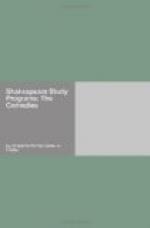Is Kate’s entreaty to stay, or her action in showing her bridegroom the door the climax of the wedding scene? What is the point in the stage business of Petruchio’s speech warning others not to touch his chattel? Is she really being befriended by the bystanders when she declares they must go “forward to the bridall dinner” or is she so entirely alone in her opposition to Petruchio’s command to go, that his speech is the keenest satire upon her defencelessness in every direction but through him?
Is Petruchio’s conduct at home and the servants’ comment upon it such as to make Kate’s two entreaties explicable?
What light does Petruchio’s own account (iv, i, 183-207) of his method throw upon it?
In the eating and haberdasher scene (iv, iii) what is it Kate learns—merely that she cannot command by force and can have what she wants by another method? What is the secret of her tractableness in Scene v?
QUERIES FOR DISCUSSION
Are Katherine and Petruchio the most interesting characters in the Play? Why?
Is their prominence due to their personal attractiveness or to the Dramatist’s skill?
V
THE TRIPLE MARRIAGE AND THE MORAL
Why should the Play not end with Act iv?
What does Act V add?
Is the quality of the table-talk in keeping with the plot and characters?
The husbands’ talk and wager turns on what point, obedience to the husband, or agreement of husband and wife as mutually to their interest?
Show the drift of Kate’s expression of the moral of the Play, and state your own way of looking at it.
QUERIES FOR DISCUSSION
Did Petruchio and Kate give an impromptu performance of conjugal felicity, or one decided upon beforehand?
Was Kate quick-witted enough to guess there was money in it, or was she really, once of a different mind and reformed.
VI
THE FOLK ORIGIN OF THE TAMING
Trace the antiquity of this schooling of a wife, and the resemblances and contrasts in the chief variants of the story (for help in this see Sources in “First Folio Edition").
Is there any progress to be discerned in the degree of bodily force deemed expedient?
Is any such scheme of the marriage-relation compatible with advanced civilization, or is it peculiar to crude notions of life in a taming age?
QUERIES FOR DISCUSSION
Is the folk-legend indicative of an inherent relation in marriage of the male and female natures, or is it merely an expression of established custom and legalized institution upon gaining for each the aims and line of conduct desired? If so, is the result of the process to gain a ground of mutual compromise and accommodation and a division of labor in joint life which will enable the process itself to fall into disuse.




